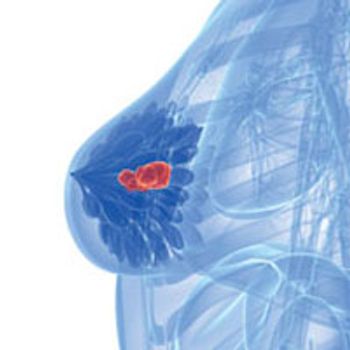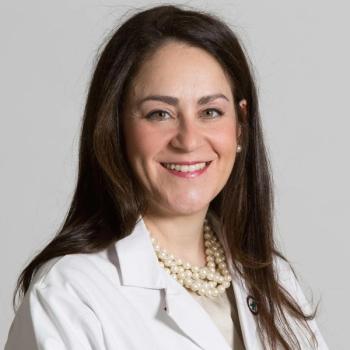
Study finds some individuals have genetic variants that allow them to have long-term exposure to a carcinogen without developing lung cancer.

Study finds some individuals have genetic variants that allow them to have long-term exposure to a carcinogen without developing lung cancer.

The PD-1 agent nivolumab (Opdivo) was FDA approved October 9 for patients with non-squamous non-small cell lung cancer (NSCLC) whose cancer progressed during or following platinum-based chemotherapy.

The antiemetic NK-1 antagonist aprepitant (Emend) was shown to significantly reduce cough in patients with lung cancer, according to findings of the first antitussive trial in patients with lung cancer using objective quantification of cough.

A novel approach using an automated system of remote monitoring coaching system can help relieve particular stressors caused by adult children caring for their parents receiving hospice care at home.

Short videos can enhance-though not replace-patient and family treatment conversations with their healthcare providers, a recent study shows.

Ashley Dietrich was diagnosed with Hodgkin's Lymphoma while pregnant at 6 weeks. Ashley's son, Beckett Anthony, was born in 2011.

New Online Resources Now Available for Lung Cancer Caregivers

Genetic counseling before BRCA genetic testing improves patient knowledge, understanding, and satisfaction. However, a new analysis has found that most women undergoing BRCA genetic testing did not receive counseling prior to testing, despite national guidelines and recommendations.

New Technology Streamlines Financial Assistance Approval for Eligible Patients

Good nutrition is an important component in any patient's cancer journey. A healthy diet is needed to maintain appropriate body weight and strength, absorb the proper nutrients, keep body tissue healthy, and fight infection.

Optune (formally the NovoTTF-100A System) in combination with adjuvant temozolomide, has been approved by the FDA to treat patients newly diagnosed with glioblastoma multiforme (GBM) following surgery, chemotherapy, and radiation therapy.

Improvement or a necessary evil?

For patients with painful bone metastases, an intervention combining palliative care with radiation oncology led to better results, according to preliminary findings from a new study.

The American Society of Clinical Oncology (ASCO) and the American Academy of Hospice and Palliative Medicine (AAHPM) have partnered to create a consensus definition of high-quality palliative care incorporated into oncology practices.

An important aspect of patient-centered care is ensuring that those with advanced cancers have their values respected and their goals for care met at the end of life.

Women with a certain type of breast cancer whose tumors have a favorable gene-expression profile may be able to safely avoid chemotherapy without an increased risk of recurrence, a new study has found.

The PD-1 inhibitor pembrolizumab (Keytruda) was approved by the FDA today for patients with pretreated advanced non–small cell lung cancer (NSCLC) across all histologies whose tumors express PD-L1.

Little is known about the potential benefits of adjuvant radiotherapy in older women diagnosed with triple-negative breast cancer (TNBC), but findings of a retrospective study reported at the 2015 Breast Cancer Symposium suggest that the approach may be worth considering for this population.

The FDA has approved the combination of nivolumab (Opdivo) and ipilimumab (Yervoy) as a treatment for patients with BRAF V600 wild-type unresectable or metastatic melanoma

Children exposed to residential pesticides are at a higher risk of developing pediatric hematopoietic cancers, a new study has found.

LLS Closes Blood Cancer Awareness Month by Celebrating Impact of our Investment in Lifesaving Research – Helping to Make Someday, Today, for Blood Cancer Patients

Chemotherapy in young women can damage ovaries and result in premature menopause, but new research shows that the addition of hormonal treatment may preserve ovarian function and fertility in patients with breast cancer and may increase the chances of pregnancy after treatment.

USPSTF issues draft recommendations.

SPOHNC is pleased to introduce EmergingMed's Clinical Trial Navigation Service. We want you to be aware of all of your treatment options. SPOHNC has partnered with EmergingMed to offer you a way to take action.

The Bladder Cancer Advocacy Network (BCAN) and Paradigm today announced a partnership for the launch of a large-scale genomically-driven bladder cancer study. The Hoosier Cancer Research Network (HCRN) will act as the coordinating center.

Rolapitant (Varubi), which was recently approved by the FDA, has been shown to significantly reduce delayed phase CINV when used in combination with other antiemetic agents.

The Patient Access Network (PAN) Foundation launched a new patient assistance program for Medicare patients being treated for heart failure.

Regardless of insurance status, patients with multiple myeloma can expect financial hardships-even those making over $100,000 a year, according to a study published online in Lancet Haematology.

The oral nucleoside TAS-102 (Lonsurf) received FDA approval today for the treatment of patients with advanced colorectal cancer (CRC) who are not responding to other treatments.

In the past 12 months, women have been more likely to have seen their primary physician, dentist, eye doctor, and hairdresser than their OBGYN, according to results of a new survey.